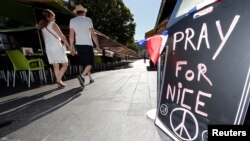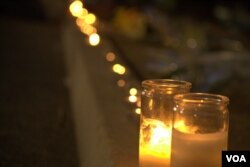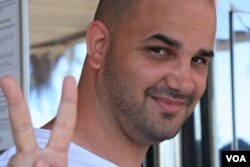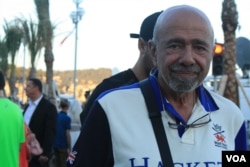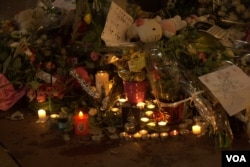“We thought we might understand better what happened if we came here,” said Giorgio Jaquet, a tennis coach from Nice, gazing at one of many memorials that now mark a two-kilometer stretch of this city's Riviera beachfront promenade.
“But we still don’t understand,” Jaquet added as he looked around at what was a scene of terror on Thursday night. “There were so many children.”
Gently rocking a stroller with their 7-month-old baby inside, his wife, Carla, said, “We are so sad for the children.”
At least 10 children were among 84 people killed Thursday night as families were watching a fireworks display celebrating Bastille Day, France’s main national holiday.
Rampage on wheels
The holiday joy ended when Mohamed Bouhlel, a 31-year-old Tunisian who lived in Nice, tore through the crowds in a large truck, crushing people to death until he was shot dead by police.
The death toll is expected to rise beyond 84. At least 20 people still alive are gravely wounded, and others have been seriously injured.
Nice, a Riviera city known for tourism and tolerance, remains stunned by the carnage. Some people here are skeptical the attack was planned by a terror group, despite official claims that it was at least related to, if not planned by, Islamic State militants.
“In Nice we never had a problem with radicals,” said Morad Amar, a 30-year-old salesman, standing across the street from the largest memorial at the end of the deadly ride. “Anyway, he cannot say he is a Muslim. He’s a terrorist.”
Islamic State claims
Islamic State militants say Bouhlel was a “soldier” answering the terror group's call for attacks on countries fighting against IS in Iraq and Syria. The militants have not, however, specifically claimed that they had a role in planning or executing the murderous truck rampage.
Known to local authorities for petty theft and street fighting, Bouhlel was not on any terrorist watch list. French Interior Minister Bernard Cazeneuve said there was evidence that he was ‘‘radicalized very quickly.’‘ Five people, including Bouhlel's ex-wife, were in custody being questioned.
At the memorial along the promenade, locals and tourists lay flowers, dolls and notes in piles. A large, colorful sign read, “We are Nice.” As the sun fell, candles were lit and the crowds thickened.
“People are coming out because they don’t want things to change,” said Giorgio Jaquet. “They don’t want to bend to terrorism.”
Danger in Europe
Najib Trad, a 63-year-old Lebanese advertising executive, came to Nice for a holiday on Thursday. He and his wife were watching the fireworks from their hotel when the mayhem began.
“We saw the people running like crazy,” he said.
Despite a rash of attacks in Europe over the past year and a half — among them two major attacks in Paris and the Brussels bombings that collectively killed nearly 175 people — Trad said it was still hard to see violence in a country long considered safe.
“Definitely it is shocking,” he said, “We have faced problems in Lebanon for 40 years. We get used to these things.”
Carla Jaquet, rocking her infant, disagreed. She is originally from Peru, where civil war between 1980 and 2000 killed 70,000 people.
“I have lived with terrorism before,” she said. “You can continue living, but it will never be normal.”




